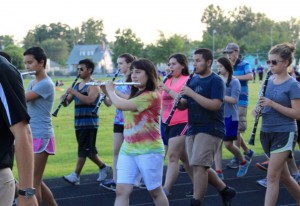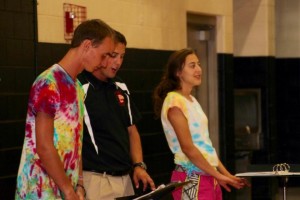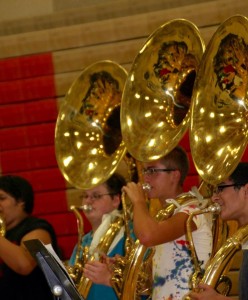Action for Music Education
Learning music helps young people do better in school and in life. Research tells us that students active in school music programs are more  successful; students say that their commitment to music keeps them focused and motivated in everything they pursue.
successful; students say that their commitment to music keeps them focused and motivated in everything they pursue.
Music is basic to our development and expression. Yet music and arts education programs are being cut or reduced in public schools. As a parent, community member or business owner, your voice must be heard to influence school budget and curriculum decisions to assure all children have access to music education.
To learn more about what you can do to build community and government support for music education, please read this informative Grassroots Advocacy Guide produced by NAMM and the National Association for Music Education. www.SupportMusic.com
Did You Know?
- A 2000 Georgia Tech study indicates that a student who participates in at least one college elective music course is 4.5 times more likely to stay in college than the general student population.
– Dr. Denise C. Gardner, Effects of Music Courses on Retention, Georgia Tech, 2000 - The part of the brain responsible for planning, foresight, and coordination is substantially larger for instrumental musicians than for the general public.
– “Music On the Mind,” Newsweek, July 24, 2000 - Music majors are the most likely group of college grads to be admitted to medical school. Physician and biologist Lewis Thomas studied the undergraduate majors of medical school applicants. He found that 66 percent of music majors who applied to med school were admitted, the highest percentage of any group. For comparison, (44 percent) of biochemistry majors were admitted. Also, a study of 7,500 university students revealed that music majors scored the highest reading scores among all majors including English, biology, chemistry and math.
– “The Case for Music in the Schools,” Phi Delta Kappan, 1994
– “The Comparative Academic Abilities of Students in Education and in Other Areas of a Multi-focus University,” Peter H. Wood, ERIC Document No. ED327480 - A research team exploring the link between music and intelligence reports that music training – specifically piano instruction – is far superior to computer instruction in dramatically enhancing children’s abstract reasoning skills necessary for learning math and science.
– Dr. Frances Rauscher and Dr. Gordon Shaw, Neurological Research, University of California at Irvine, February, 1997 - College students majoring in music achieve scores higher than students of all other majors on college reading exams.
– Carl Hartman, “Arts May Improve Students’ Grades,” The Associated Press, October, 1999
- Music students demonstrate less test anxiety and performance anxiety than students who do not study music.
– “College-Age Musicians Emotionally Healthier than Non-Musician Counterparts,” Houston Chronicle, 1998 - On the 1999 SAT, music students continued to outperform their non-arts peers, scoring 61 points higher on the verbal portion and 42 points higher on the math portion of the exam.
– Steven M. Demorest and Steven J. Morrison, “Does Music Make You Smarter?,” Music Educators Journal, September, 2000 - Researchers at the University of Muenster in Germany have discovered that music lessons in childhood actually enlarge parts of the brain. An area used to analyze the pitch of a musical note is enlarged 25% in musicians compared to people who have never played an instrument. The earlier the musicians were when they started musical training, the bigger this area of the brain appears to be.
– Pantev et al., Nature, April 23, 1998 - Research shows when a child listens to classical music the right hemisphere of the brain is activated, but when a child studies a musical instrument both left and right hemispheres of the brain “light up.” Significantly, the areas that become activated are the same areas that are involved in analytical and mathematical thinking.
– Dee Dickinson, “Music and the Mind,” New Horizons for Learning, 1993 - The Pittsburgh, Pennsylvania School District analyzed its 1997 dropout rate in terms of students’ musical experience. Students with no ensemble performance experience had a dropout rate of 7.4 percent. Students with one to two years of ensemble experience had a dropout rate of 1 percent, and those with three or more years of performance experience had a dropout rate of 0.0 percent.
– Eleanor Chute, “Music and Art Lessons Do More Than Complement Three R’s,” Pittsburgh Post-Gazette, April 13, 1998
Citation: http://www.uah.edu/la/departments/music/about-music/why-study-music
News and Research
Music Training Primes Nervous System and Boosts Learning (Northeastern University, July 20, 2010)
Music Education Helps Improve Reading Skills (Science Daily, March 16, 2009)
Adolescents Involved With Music Do Better In School (Science Daily, February 11, 2009)
Boston Globe Op-Ed Article “Art’s power to teach 21st-century skills” (December 8, 2008)
NBC Report on Link Between Music Education and Cognitive Development (March 5, 2008)![]()
The New Jersey Arts Education Census Project…
is one of the most comprehensive efforts ever undertaken by any state to gather, evaluate and disseminate data regarding arts education in every public school. Although this study was not conducted in Florida, the census results and comprehensive resources supporting arts education are applicable across the nation.
2007 Harris Poll Links Music Education To Success in Life
Independent poll shows a positive association of music with lifelong educational attainment and higher income.
NBC News Story on the Positive Impact of the Arts in an Urban School
How commitment to providing a quality arts education helped turn one urban school around.
Citation
Information copied with permission from Kevin Ford: Tarpon Springs Band